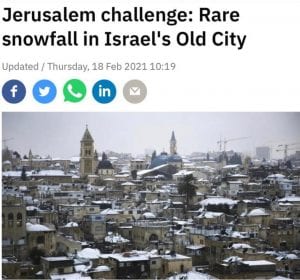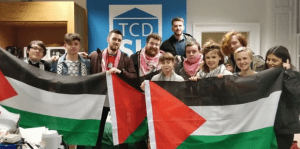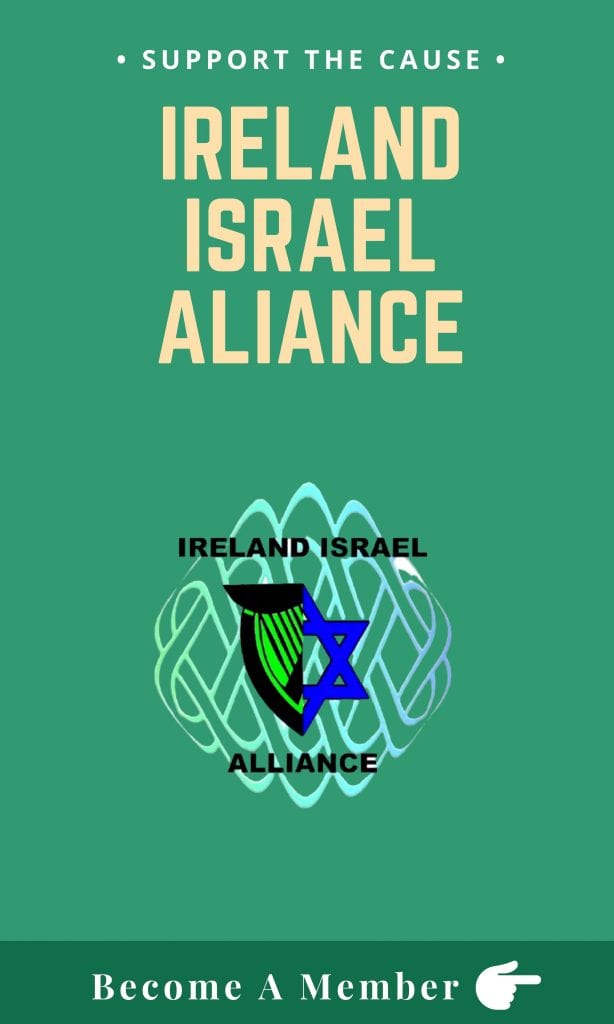In a week when the Dutch parliament voted to sharply reduce aid to the Palestinian Authority (PA) due to its “pay-for-slay” policy, below is a report on Irish aid to Palestinians – with a particular focus on contributions to NGOs (non-governmental organisations).
Irish financial aid to the Palestinian Arabs
In January 2018, Ireland’s Tanaiste (Deputy Prime Minister) and Foreign Minister Simon Coveney invited Mahmoud Abbas to make an official visit to Ireland. Mr Abbas, elected in early 2006 to a four-year term as Chairman of the Palestinian Authority (PA) and now nearing the end of his fourteenth year in that office (though no further elections have taken place), accepted the invitation.
In September 2018, Mr Abbas, the head of a ‘state’ that does not exist (that’s another story) was received at Áras an Uachtaráin by the Irish head of state, President Higgins. Mr Coveney used the occasion to announce a grant of €1 million in financial aid to the UN Relief and Works Agency (UNRWA) in addition to the €6 million already donated by Ireland in 2018.
Outside, pro-Israel protesters shouted their opposition to the ‘pay-for-slay’ policy of the Palestinian Authority under which Arabs arrested in the process of murdering or attempting to murder Jews are paid a stipend while serving their prison term; if killed, their families receive the stipend. According to a report by Yossi Kuperwasser of the Israeli advocacy group Jerusalem Centre for Public Affairs, in 2017 half of the $693 million received by the PA as foreign aid, $345 million, was paid out as stipends to convicted terrorists and their families.
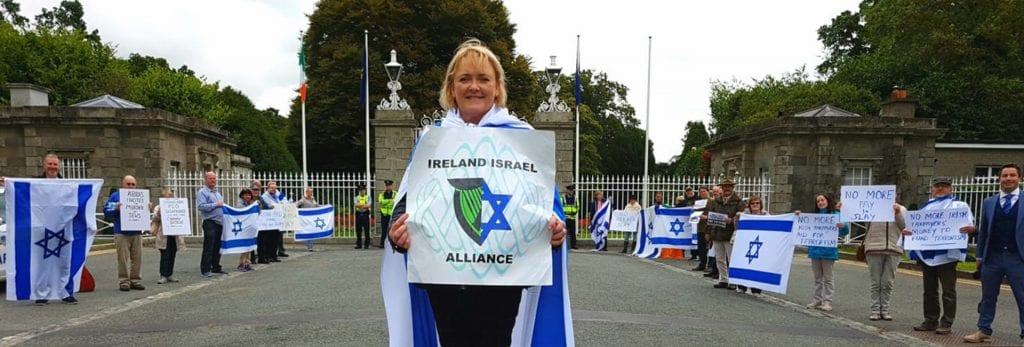
Three months later, Mr Coveney followed up with a further donation of €2 million, bringing the total Irish contribution to UNRWA to €9 million for the year. Announcing the latest he said: “At the UN General Assembly in New York in September, I encouraged Member States to increase their funding to UNRWA and I said that Ireland hoped to be able to provide US$10m to UNRWA this year. This additional funding makes good on that promise.”
Ireland’s donations to UNRWA are not, however, the full story of Irish aid to the Palestinians. The total funding provided by Ireland to the Palestinian people in 2018, Mr Coveney declared, would amount to €15.38 million. This figure may look small in absolute terms alongside those of larger EU states such as Germany, which donated a total of €110 million in 2018. But in per capita terms it represents an Irish contribution of €3.14 for each man, woman and child, more than twice the German rate of €1.49.
There are many grounds for criticising UNRWA and its Irish funding to the tune of €9 million. They are a topic for another article. The purpose of the flowcharts shown here is to give an idea of where a significant sum of Irish taxpayers’ money went in 2016-17 to organisations other than UNRWA under the heading of ‘aid to the Palestinians’.
What do the charts show?
Total Irish Aid funding, direct and indirect, of anti-Israel NGOs in recent years has exceeded €1.5 million.
As shown in Chart A, Irish Aid in 2016-17 sent three-quarters of a million euro directly to at least six Palestinian NGOs engaged in political campaigning against Israel in one form or another.
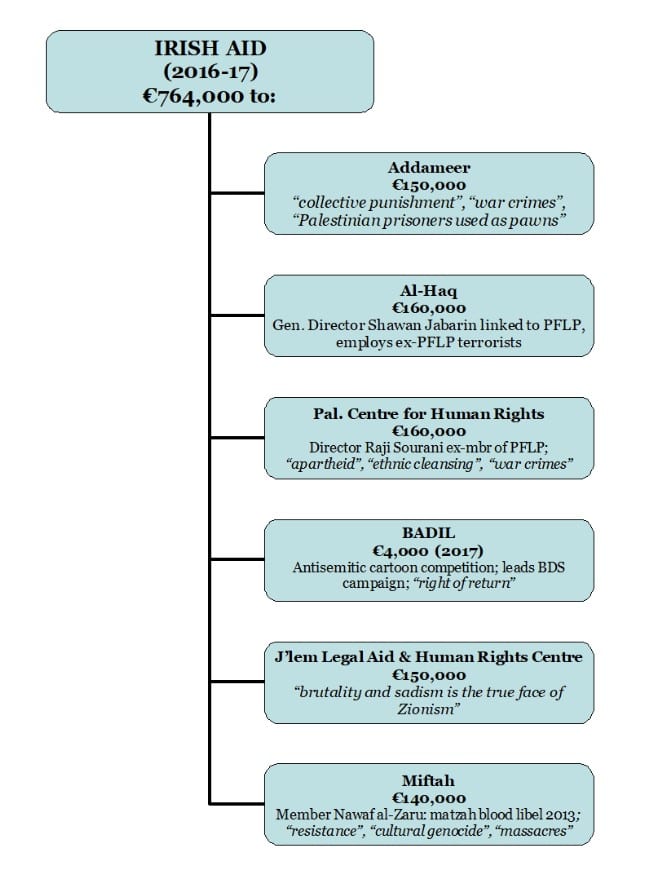
A. IRISH AID DIRECT FUNDING TO PALESTINIAN ARAB NGOs
Chart B shows the direct flow of money in 2016-17 to nine anti-Israel NGOs with headquarters in Ireland or the UK – the principal ones are Trócaire (the overseas development agency of the Catholic Church in Ireland) and Irish Christian Aid – which altogether received a total of €82.8 million.
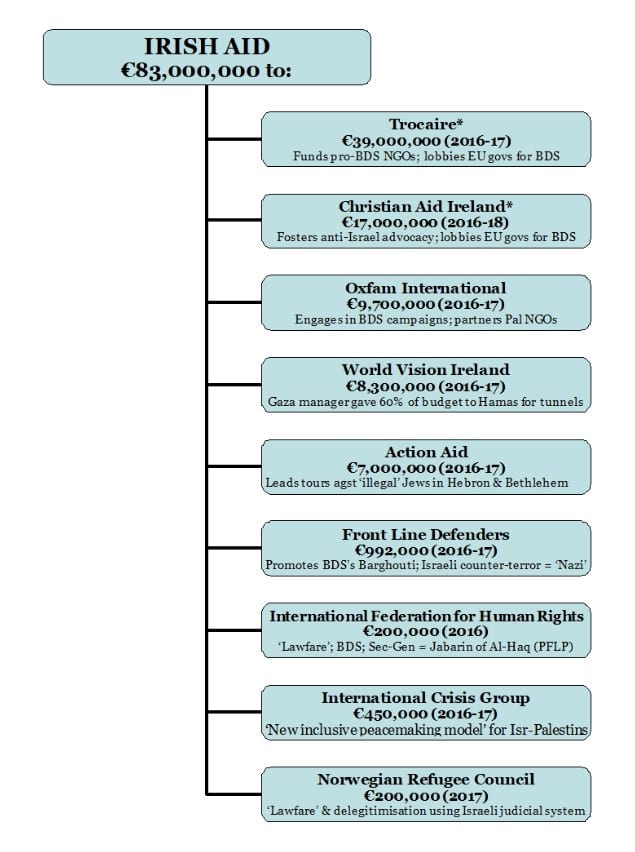
B. IRISH AID DIRECT FUNDING TO IRISH ANTI-ISRAEL NGOs
Most of the money directed at this second group, of course, is not ultimately targeted at Palestinians. However, as Chart C shows, a total of €292,891 is passed on by Trócaire to four Palestinian and Israeli NGOs (the amounts given to two others have not been disclosed).
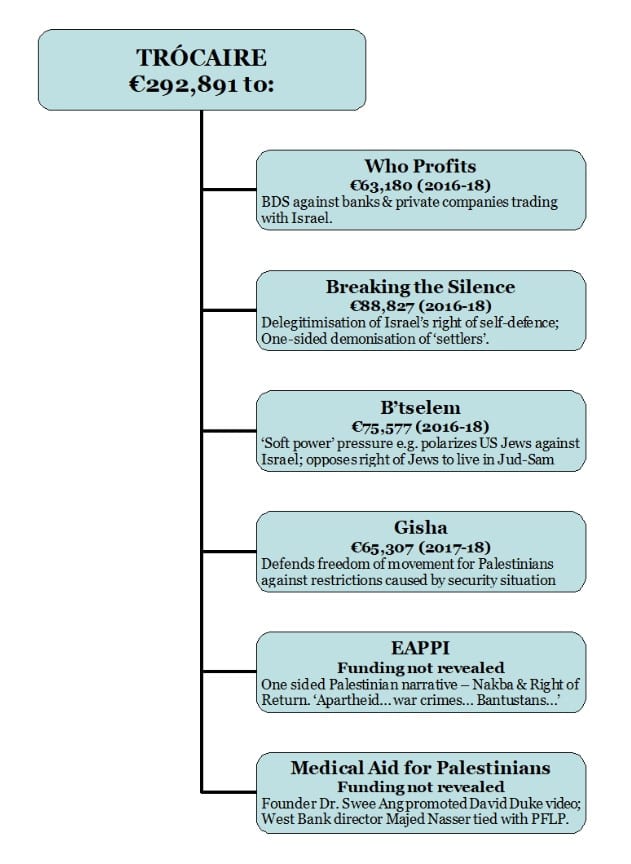
C. IRISH AID INDIRECT FUNDING TO ANTI-ISRAEL NGOs
And as Chart D shows, Christian Aid passes on €404,000 to six similar NGOs.
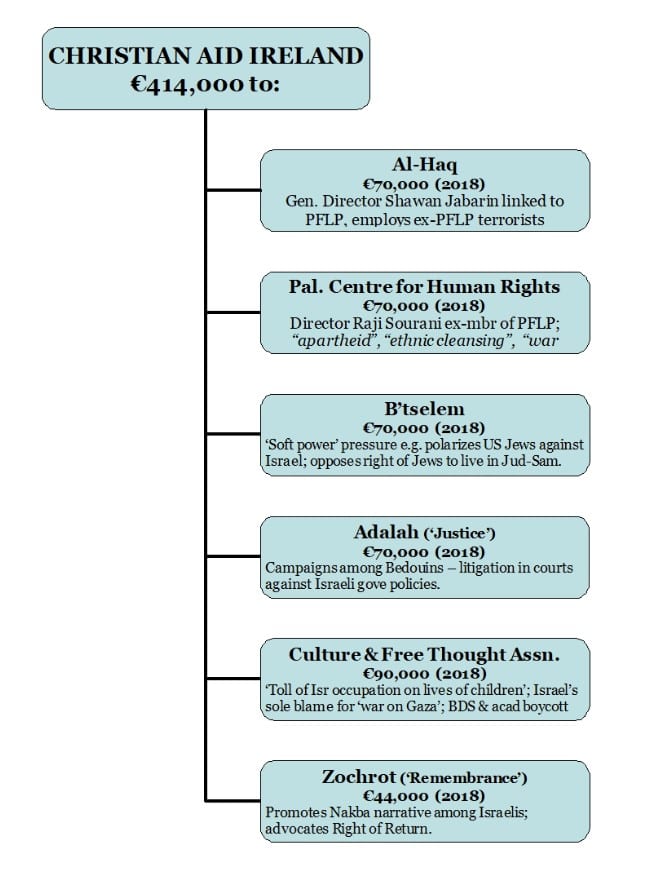
D. IRISH AID INDIRECT FUNDING TO ANTI-ISRAEL NGOs
Thus, Trócaire and Irish Christian Aid not only receive large funds from Irish Aid in their own right but act as conduits for at least €800,000 in indirect funding from Irish Aid to smaller (so-called ‘human rights’ but actually political) NGOs.
NB: All figures and dates in the charts come from ‘NGO Monitor – Government funders: Ireland’, htpps://www.ngo-monitor.org/funder/Ireland
Do Irish taxpayers know exactly what they are funding?
Are Irish taxpayers aware, for example, that:
(1) Al-Haq, to which they gave €160,000 directly through Irish Aid and €70,000 indirectly through Irish Christian Aid, has as its general director Shawan Jabarin, who served three years in prison for terrorist offences, was a senior figure in the Popular Front for the Liberation of Palestine, an EU-designated terrorist group, and employs convicted former members of PFLP?
(2) Addameer, to which they donated €150,000 directly through Irish Aid, is an official ‘affiliate’ of the PFLP, and that some of its staff members have alleged connections to the group; that its chairperson and co/founder Abdul/Latif Ghaith was an alleged member of PFLP who was banned from entering the West Bank between 2011 and 2015?
(3) director Raji Sourani of the Palestinian Centre for Human Rights, which received €160,000 directly from Irish Aid, is also a former senior member of the PFLP?
(4) Miftah, which received €140,000 in direct Irish funding, and which accuses Israel of ‘cultural genocide’ against the Palestinians, published in 2013 a repetition of the old anti-Jewish blood libel alleging that Jews in the past used the blood of Christians in the Passover feast?
(5) seven of the nine Irish/UK ‘charities’ funded directly by Irish Aid actively promote the policy of Boycott, Divestment and Sanctions (BDS) against Israel, a policy directly contrary to the Irish Government’s own policy of encouraging peace negotiations and a two-state solution?
(6) the local Gaza manager for World Vision Ireland, which received €8.3 million from Irish Aid, gave 60% of his budget to Hamas, which that group used for the construction of attack tunnels under the Gaza border?
(7) €4,000 was given to BADIL, a leading supporter of the Boycott, Divestment and Sanctions (BDS) campaign, which staged an antisemitic cartoon competition?
The big picture
To understand the proliferation of anti-Israel organisations funded by European governments, we must briefly turn to look at Israel’s experience since its inception as a state in 1948. Having survived, at a huge cost in lives, the encirclement and invasion by five Arab states aimed at eradicating it at birth, it faced two further wars against hostile Arab states over the following 25 years, the Six Day War of 1967 and the Yom Kippur War of 1973. In between, it had to cope with constant terrorist incursions and missile attacks from neighbouring territories. None of these succeeded in preventing it from growing in population, in prosperity and in confidence as the independent nation state of the Jewish people.
For Israel’s irreconcilable enemies, a new strategy was needed – a switch to ‘softer’ forms of warfare. At the 2001 Durban conference, organized by the United Nations Commission on Human Rights, the new tactic of borrowing the rhetoric and slogans of ‘human rights’ agitation to delegitimize Israel as ‘an apartheid regime’, was adopted. The strategic goal is the international isolation of Israel on the South African model. Article 426 of the declaration of the conference seeks the ‘condemnation of those states who are supporting, aiding and abetting the Israeli apartheid state and its perpetration of racist crimes against humanity including ethnic cleansing, acts of genocide.’
The two decades since Durban have spawned a huge network of NGOs, active especially in the European Union, the Palestinian Authority areas and Gaza, and even in Israel itself. They play a variety of roles in the work of delegitimization but are united in seeking boycotts of Israel.
Some of the NGOs constitute the front line of the attack – those that directly challenge Israel’s right to exist by promoting the narrative of the ‘Nakba’ and the demand for the ‘right of return’. In this group are those that allege that Israel practises ‘ethnic cleansing’, ‘apartheid’ and ‘genocide’ against the Palestinian Arabs. These allegations are easily disprovable but, through the power of repetition, are nevertheless believed by many around the world. Some of these NGOs, such as Miftah, act as mouthpieces for the terrorist groups with which they have close links, calling their actions desperate acts of ‘resistance’ made necessary by the evils alleged against the Zionist enemy.
Second come the NGOs that spring into action whenever Israel defends itself – those that brand the Israeli anti-terror response as ‘disproportionate’, ‘war crimes’ and ‘gross violations of international law’. From this source comes, for example, the pretense that the violent crowds attacking the Israel-Gaza border fence and trying to break through to kill Israelis are really ‘peaceful protesters’ shot down in cold blood by the Israeli military. We have also seen the branding of the security barrier erected to keep out the suicide bombers and other terrorists who had murdered 1,100 Israelis between 2000 and 2005 as an ‘apartheid wall’, and the condemnation of the air strikes on Hamas and Islamic Jihad rocket launch sites in Gaza from where more than 16,000 rockets have been fired at Israel since 2005.
There is a third group of NGOs that concentrate on the so-called ‘occupied territories’ – Judea-Samaria (the West Bank) and east Jerusalem – and on the supposed sufferings of Palestinian Arabs living there under military control (only about 4 per cent of Palestinians live under actual military control in Area C of the West Bank). These organisations reject the right of Jews to settle there and, adopting a different interpretation of international law, label the Jewish towns and the people who live in them as ‘illegal’ and claim that their presence there is the main barrier to peace. Since these settlements are a controversial issue in Israeli politics, Israeli citizens and NGOs are among those who campaign against their government’s policies there.
Finally, a small group of NGOs take up legitimate grievances of groups such as the Bedouins. Such issues are perfectly capable of being dealt with by the Israeli courts, but anti-Israel groups abroad find them useful as ways to blacken Israel’s image further. In addition, there are groups that set out to abuse the court system by launching multiple litigations aimed at clogging the system.
In summary, there is now a large army of NGOs waging a war on various fronts against the Jewish state, seeking a victory where military force had previously failed.
The even bigger picture
There is no other state in the world whose existence is questioned and threatened as is that of Israel. Is there an army of governments and NGOs campaigning against the occupation and settlement policies of states in other conflict zones around the world?
The international lawyer Eugene Kontorovich has published “Unsettled: A global study of settlements in occupied territories” (2017). The book is the first comprehensive examination of international legal practice bearing on Article 49(6) of the Fourth Geneva Convention – the provision that forms the basis for legal criticism of Israeli settlement policy. Dealing with the seven most important occupation-and-settlement situations apart from Israel/Palestine –
- Indonesia/East Timor
- Morocco/Western Sahara
- Turkey/Cyprus
- Syria/Lebanon
- Vietnam/Cambodia
- Armenia/Nagorno-Karabakh
- Russia/Georgia and Ukraine
– he asks whether, in any of the seven cases, the settlement activity of the occupier has been condemned by any state or international organisation as a violation of Geneva Article 49/6. The answer is no in every case. We will quote two examples:
Here is Kontorovich’s summary of Morocco/W. Sahara:
‘Morocco’s settlement program in Western Sahara is one of the longest, largest, and most ambitious in the world. It involved transporting hundreds of thousands of settlers across a vast desert and implanting them in a difficult and hostile environment, at great expense to the occupying power. It also is one of the most demographically consequential, with the settlers now amounting to a substantial majority of the territory’s population. The Moroccan settlers, by their sheer numbers, undermine the possibility of Saharawi self-determination called for by the ICJ, and also exploit the scarce natural resources of the territory.
Despite significant interest in the situation, and repeated criticisms of Morocco’s presence in the territory, no state or international organization has commented in any way on the settlement policy.’
And here is his summary of Turkey/Cyprus:
‘The ongoing Turkish occupation of northern Cyprus constitutes one of the most substantial settlement enterprises today, and is particularly notable in that it takes place within the territory of the European Union. The majority of the territory’s population now consists of settlers, with a substantial ongoing influx … Settlers have received substantial assistance and incentives from the Turkish government, though the extent of inducement has varied over time. Moreover, the influx of settlers has been at a direct cost of displacement and dispossession of the prior Greek inhabitants. Despite this, no international organization and no state (aside from the Republic of Cyprus) have described the settlement program as a violation of the Geneva Convention, or otherwise illegal. Similarly, the ICC prosecutor is authorized to—and has been asked by Cypriot refugees—to investigate war crimes on the island dating back to 2002, but apparently the Turkish settlement project has not merited her attention (see Kontorovich 2014).’
As with states and international organisations, so with NGOs. The only conclusion to be reached is that Israel is uniquely the target of international criticism for a settlement policy that is, ironically, based firmly on international law deriving from the San Remo Treaty of 1920, the League of Nations Mandate of 1922 and the UN Charter Article 80 of 1945.
Is it antisemitism?
Europe’s treatment of its Jewish minorities has been one of the greatest blots on the great Christian civilisation of the continent. In every century of the last millennium, from the murder of Jews in 12th century England to the forced mass conversions and burnings of 14th-15th century Spain, from the 17th century slaughters in Poland and Ukraine through the 19th-20th century Russian pogroms to the Nazi Holocaust, the record of persecution is a grim one.
The closing off of entry to Mandate Palestine for Jews fleeing antisemitic Europe in the late 1930s, access that might have saved many tens of thousands of Jewish lives, reflects little credit on the British authorities of the time. The transit camps at Drancy, Westerbork and Mechelen from where French, Dutch and Belgian Jews were shipped to Auschwitz-Birkenau could not have functioned without at least the passive support of local administrations and populations. And then there is Ireland’s refusal to allow officially any Jews at all into the country, either before 1939 when the danger to their lives was increasingly obvious, or after 1945 when the continent brimmed with more than 100,000 displaced and devastated Holocaust survivors.
It is hard to believe that the modern successors of these states, even as they profess horror at the atrocities committed within their borders against their Jewish citizens 75 years ago, are still hounding their descendants in the place to which they fled. But that, at least, is the implication of the policy adopted by the governments of the EU to support with large sums of money the legion of organisations waging warfare by non-military means against the Jewish state.
The Israeli novelist Amos Oz recalled that, when his father was a child in 1930s Ukraine, the cry of the local antisemites was ‘Jews, go back to Palestine!’ But now that a large number of the continent’s surviving Jews and their descendants had found refuge and built a successful state in their ancestral land, by a bitter irony, the cry went out from Europe: ‘Jews, get out of Palestine!’
Is it an exaggeration to call this an antisemitic policy? Attempts are made to justify it for the sake of justice for the Palestinian Arabs, though they have rejected every offer of a two-state resolution, or out of concern for a peace process that does not exist. It is claimed that a historic wrong committed against the Arab world must be righted, though Israel sits on a mere 3.6 per cent of the territory that emerged from the Ottoman empire in 1920, the rest going to the Arabs.
As Kontorovich has shown, these governments do not behave in this way towards any of the other states involved in situations of genuine occupation and settler transfer. In those cases, there is no citing of the Geneva Convention, no calls for boycotts or goods labeling, no condemnatory resolutions passed at the UN, no threats of prosecution at the International Criminal Court at The Hague. The animus is directed exclusively against Israel. The conclusion can only be that the policy is motivated by antisemitism, whether conscious or not.
And, as Kontorovich points out, an international law that does not apply to all is not international law at all.
by Dermot Meleady


